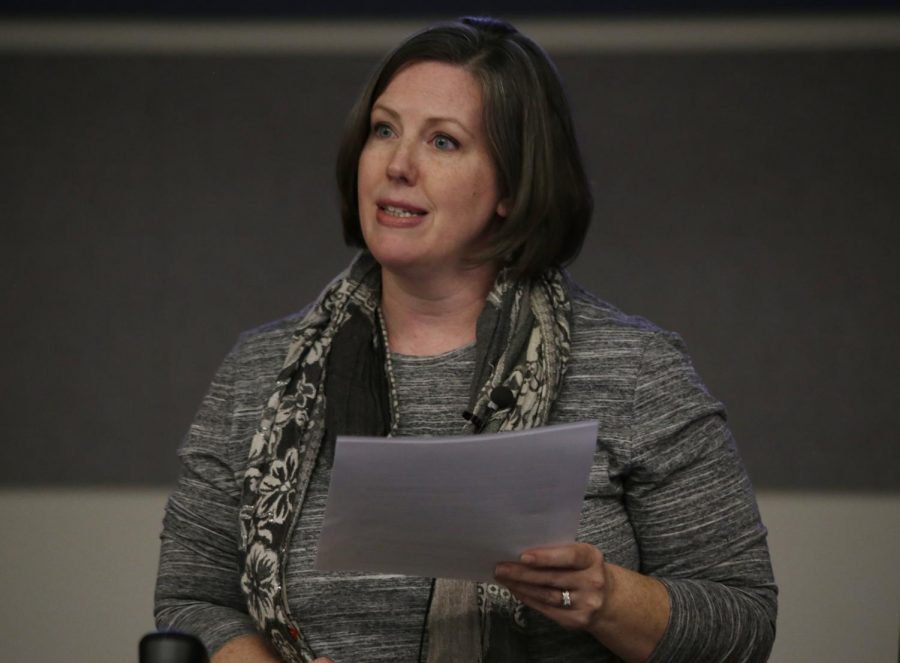Faculty criticize administration
Senate members took issue with administrators’ priorities, communication
RYAN PUGH | The Daily Evergreen
Faculty sen. Mary Trotter accuses WSU administration of misleading the public on the true costs of the Performing Arts program to the university.
November 2, 2017
In an emotional speech to the faculty senate, a professor whose position is slated to be eliminated said the university’s administration peddled false statements when justifying cutting the Performing Arts program.
In a late October email, University President Kirk Schulz outlined university-wide cuts, which included chopping down spending by 2.5 percent across the board, allowing temporary contracts for retention counselors to expire and elimination the Performing Arts program. Schulz has said WSU’s budget should be back on track after spending $10 million less for three fiscal years in a row.
In the email, Schulz justified cutting Performing Arts and its four staff members by writing that the program has spent $1.6 million of the university’s reserves since 2011 and that it did not have a permanent source of revenue.
Mary Trotter — faculty senator, clinical assistant professor in the College of Arts and Sciences and Performing Arts staff member — said the administration mislead the public on the true cost of the program.
“WSU Performing Arts has been programmatically self-sufficient,” Trotter told the senate in a prepared statement. “[We] were never tasked, nor given the opportunity, to generate funds that would fully sustain our program and our salaries.”
She cited Weiler’s statements in a Daily Evergreen column in which he said most of the program’s budget went towards bringing in outside performers and putting on productions. While the staff’s salaries do come out of reserves, Trotter said he was incorrect about the program’s expenses coming out of reserves.
“The Performing Arts unit [was] cut, at best, because it was an arbitrary decision without proper examination,” she said, “and, at worst, with assumption, with misinformation or with deceit.”
Weiler disagreed with Trotter.
“There is this misconception that this was a program that was self-supporting,” he said in an interview. “It’s just not.”
Weiler said salaries and operations account for the program’s total cost. He also said that the administration never meant to imply that Performing Arts was spending money recklessly.
When deciding which programs to cut, the university will first eliminate programs funded on reserves, he said. While Performing Arts responsibly spent the money it was given, he said, all of that money came out of the university’s savings.
“We don’t have enough money in our savings to continue to do that anymore,” Weiler said.
Earlier in the faculty senate meeting, Schulz said there was a possibility performing arts at WSU could survive if it could establish a partnership with the University of Idaho. He said WSU could not afford to keep the program.
“We have to also figure out a good way to for it in a sustainable fashion and that wasn’t there,” Schulz said.
He said every unit would argue that their services are the most important, but they would have to choose where to make cuts no matter what.
“It is certainly going to impact the number of students that come here, retention, reputation,” he said, “but, on the other hand, us not making some of these choices and putting ourselves in [a situation] where we have no reserves, and were not making payroll, is going to be a lot worse of an issue than some of the challenges we’re dealing with now.”
College of Arts and Sciences faculty senator Donna Potts worried that cutting Performing Arts would damage Schulz’s keystone Drive to 25 initiative because most of the country’s top 25 public research universities have such a program.
College of Arts and Sciences faculty senator Vilma Navarro-Daniels said the administration was contradicting itself by not providing lesser paid clinical staff and faculty more security while hiring administrators who would likely earn more than $200,000 a year.
“We would like to know if there will be an impact on the administration of the university in order, at least, to share the consequences of all this,” Navarro-Daniels said.
In response, Provost Dan Bernardo said, “I sure hope so.”
Bernardo said it would be important that the university retain as much clinical faculty as it could to make sure students, the main revenue generators, are taken care of. He said the administration would work to provide longer term and better paying contracts for clinical faculty, but administrators are needed to keep the university running.
“A good vice president for finance and administration can save us a heck-of-a-lot of money,” Bernardo said. “I think the expectation is folks will do their job well and that will result in more jobs for the university.”
Trotter asked WSU leadership to be up front about why performing arts was the only program to be entirely eliminated.
“If the truth is that WSU does not prioritize the arts nor recognize it as essential to higher education then let that be the truth to the institution.” Trotter said. “Don’t disguise it as anything else.”
















